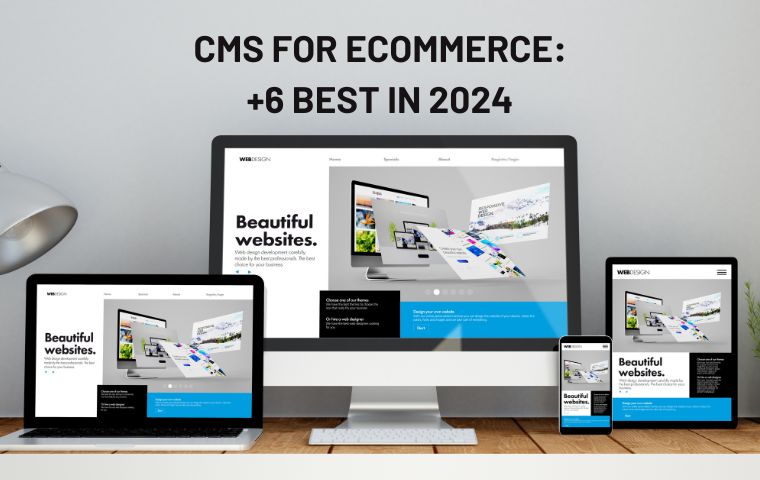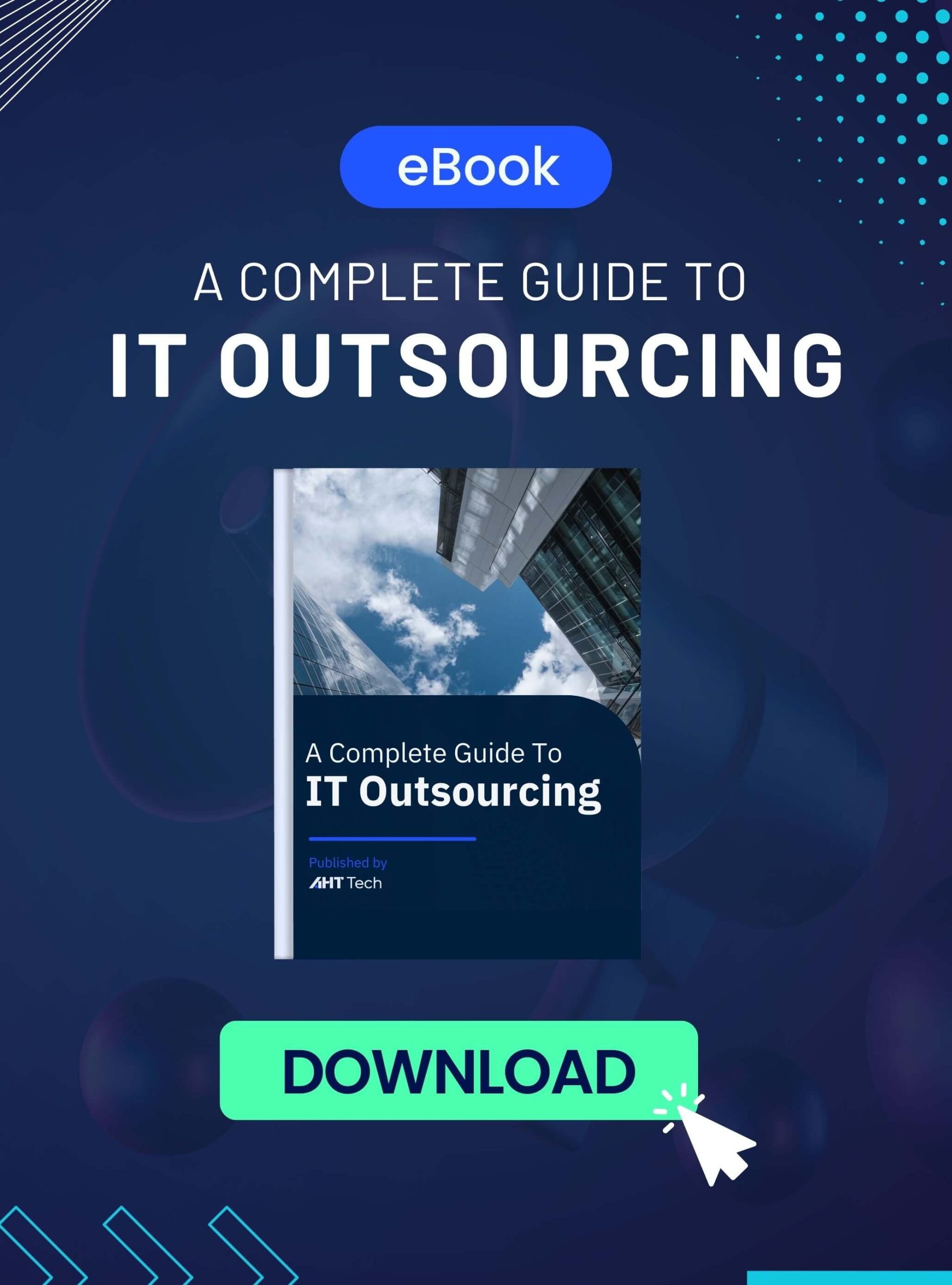TABLE OF CONTENT
What is an Ecommerce CMS?
Things To Consider Before Choosing CMS for eCommerce
Best CMS for eCommerce in 2024
Conclusion
What is an Ecommerce CMS?

A CMS is a platform that allows you to manage commercial aspects and content such as text, images, videos,… for your online store. In addition, you can also update and change content on the Website. A good CMS system will allow the Website to operate without intervention or support from the website programmer. In other words, a CMS allows you to build a website without having to code from scratch (or even knowing how to code). It acts as a single place to store content and provides automated processes for collaborative digital content creation and management using built-in or pre-designed workflows. Different rights and responsibilities are provided to individuals based on their specific roles. Here are two major categories of CMS for eCommerce.
- SaaS CMS: It can usually be accessed online without needing to install, update, or maintain anything. All you have to do is buy a subscription license and pay to use the SaaS CMS. SaaS providers take care of processes such as hardware setup, server management, data storage, etc. You also benefit from the provider’s continuous upgrades or improvements.
- Open source CMS: Exactly as its name suggests. Open source code is publicly available and can be used by anyone for free, with restrictions depending on the license type. Developers who create open-source CMS publish the code and allow others to use and modify it. This can give birth to a developer community where programmers come together to develop software, provide support to users, and continuously develop the product. Some open-source platforms have cloud hosting options, but they differ from SaaS in that maintenance remains with the store owner.
Related Articles:
Things To Consider Before Choosing CMS for eCommerce
Although opening an online store for your business may seem easy, the e-commerce retail industry is highly competitive. This makes it essential to have a solid business foundation that can help you grow your revenue and achieve business success quickly. Initially, it is important to identify the requirements of your e-commerce business. Then what features should you consider when choosing a CMS for e-commerce? It’s better to look at the core features that can help you grow your store, and then consider the right options and solutions to find the best CMS for e-commerce platform.
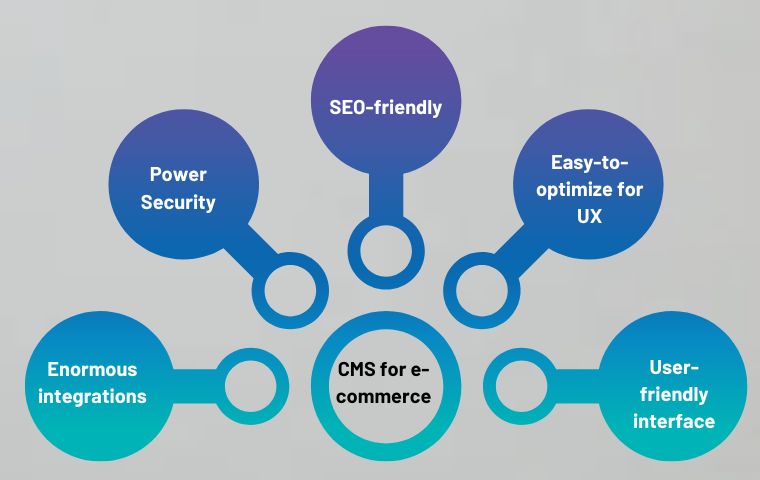
SEO-friendly
Every day, users perform billions of searches for information, products, or services. Placing your keyword search positions with high rankings is a really important way. These platforms are also packed with SEO features, including keyword placement, automatically generated canonical tags, image optimization, and rich snippet markup. If the platform is headless, you even have the option of integrating with external SEO tools. So SEO features are like a lever to help your eCommerce store reach more potential buyers through major search engines like Google, Microsoft Bing, and Yahoo,… Specifically, Some SEO features a CMS for e-commerce should have to include:
- Customizable on-page SEO elements.
- Internal linking tool.
- Ability to redirect.
- Optimize images
Easy-to-optimize for user experience (UX)
Today no customer has time to navigate a complicated website when all they want to do is make a quick purchase. A search bar that customers can use to easily find the product they need can go a long way in leaving a good impression and making customers more likely to return. That will help retain customers and increase store revenue. The approach you took to product categorization is a great example of how complicated navigation and UX can become if you don’t pay enough attention. What you need to do is quickly update your store design and page layout to meet emerging industry trends, special occasions, and promotional events. Some CMS platforms will also offer a variety of integrations and plugins to help store administrators run store-wide promotions and other marketing initiatives. Furthermore, it is increasingly clear that mobile shopping will soon dominate e-commerce. Optimizing your store and content for mobile devices should be at the top of your UX priority list if you don’t want to miss out on the mobile commerce trend. At a minimum, pay special attention to load times, mobile navigation, mobile checkout processes, images, and other UX elements that influence the mobile user experience.
User-friendly interface
Depending on the available developer resources, it may be beneficial to seek out a platform that offers a straightforward setup process without the need for a lengthy and challenging implementation. A CMS for e-commerce can assist ecommerce entrepreneurs in rapidly expanding their business, experimenting with new ideas, and enhancing the website’s user experience. It facilitates various tasks such as content updates, plugin integrations, page layout modifications, and search engine optimization, catering to individuals with varying technical expertise. That makes using a CMS for e-commerce platforms easier than ever, along with minimizing costs incurred in terms of resources and training.
Enormous integrations
Of course, nothing in this world is absolutely perfect, including the CMS for e-commerce. By integrating tools into your website, you can control the relationship between third-party software and your website, customizing the tool to fit not only your needs but those of others. user. The range of integrations available will also indicate how popular and API-friendly the CMS is. This helps you to comprehensively manage all systems rather than having to manage multiple separate systems, maximizing your time.
Power Security
With digital technology increasingly developing, good security of your e-commerce sales website will help minimize significant losses when violating network security. A good CMS system can automatically recommend updates when security vulnerabilities arise and has multiple layers of security to prevent unnecessary violations.
Best CMS for eCommerce in 2024
BigCommerce
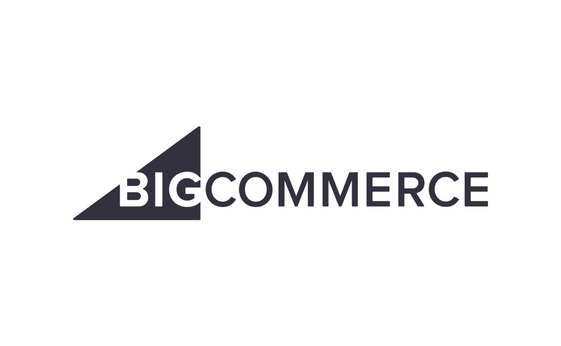
This eCommerce platform stands out as one of the most notable ones, as BigCommerce offers valuable support to business owners in the creation, management, and maintenance of their online stores. It serves the entire e-commerce industry and extends its services to a wide range of businesses, encompassing various sizes and types. The platform is known for its advanced SEO integrations and flexible APIs, including customizable URLs, meta tags, and canonical tags that allow merchants to connect with leading software and other CMS solutions, while also leveraging the BigCommerce shopping cart in the backend. It offers SEO-friendly themes and templates to ensure a solid foundation for your online store.
WordPress
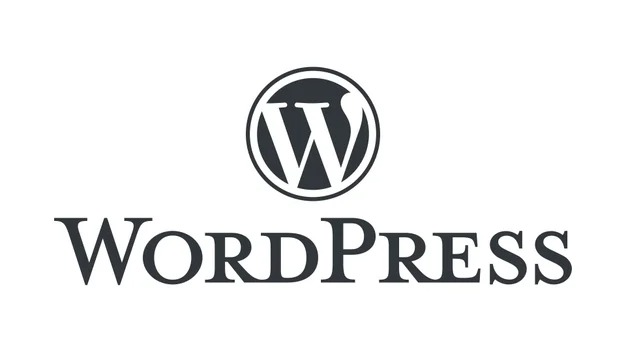
WordPress gives you all the tools you need to publish content and sell products from the same platform. Create a powerful online store and install additional plugins to help you customize your products, attract customers, and increase sales. Ensure that all modifications to your products and designs are thoroughly tested on a staging site before implementing them on your live site and impacting your customers. The integration of eCommerce with WordPress enables businesses to establish online stores, oversee product management, facilitate payment processing, manage inventory, and offer a smooth shopping experience. This integration offers adaptability, expandability, and a cohesive platform for both content management and commerce, enabling businesses to succeed in the online marketplace.
Drupal

In fact, Drupal is one of the most popular and widely used open source content management systems even though it is not designed specifically for e-commerce. With native commerce and content integration, Drupal lets you manage products, carts, and transactions as top concerns alongside media and content. Build to stay relevant and adapt to meet changing needs through third-party integrations. It must also be recognized that Drupal is not particularly user-friendly for those without significant development knowledge, although that is gradually changing for the better.
Joomla

When creating a website from scratch, With Joomla, you will never encounter errors or delays. Joomla is a freely available content management system that enables users to easily create and oversee content. It offers a blend of pre-installed features and opportunities for tailoring the system to suit advanced content management needs. Additionally, Joomla has a huge library of templates, extensions, and plugins that can help you perform various functions on your website.
Sitecore

Sitecore is the leading digital experience platform that combines content, commerce, marketing automation, and personalization with design and editing tools. The platform enables merchants to design and build digital storefront experiences and execute personalized commerce journeys. Sitecore developers harness the full potential of the platform’s cutting-edge capabilities to deliver powerful content customization and personalized shopping experiences.
Magento
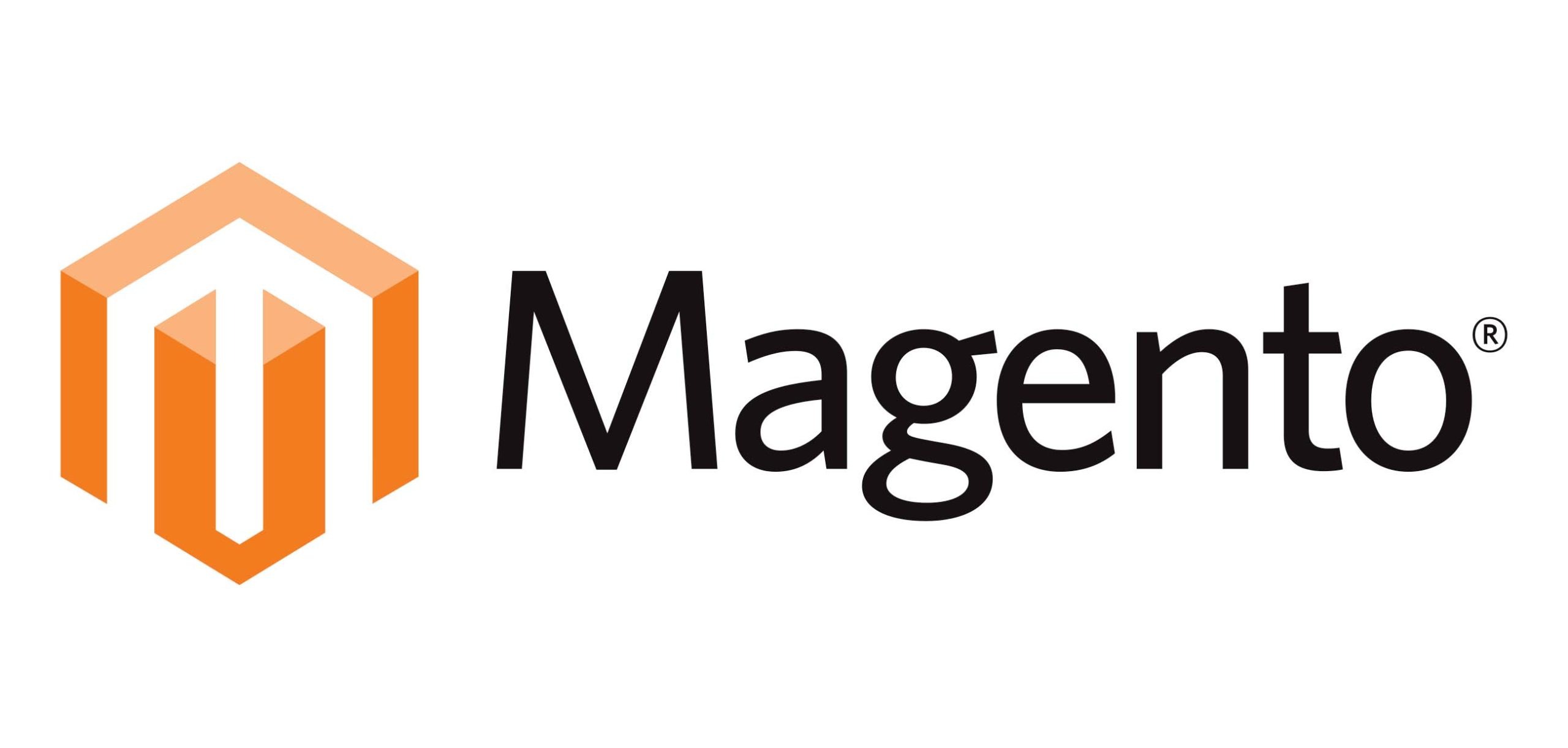
As a CMS for e-commerce, Magento is an open-source CMS to assist businesses in managing their eCommerce website. In case you have an existing system, you can migrate to Magento to upgrade features and functionalities. Besides, you can also build the new Magento CMS for e-commerce no matter what you don’t have. After setting up your store on Magento and choosing the ideal store, it offers flexibility and scalability so you can focus on expanding your business. Magento can quickly adapt to the growth of your business. Additionally, Magento delivers a wide range of extensions and themes, allowing you to integrate if required.
Conclusion
In today’s rapidly evolving digital landscape, a basic content management system is the lifeblood of any eCommerce website. Essentially, the CMS for e-commerce and technical elements are the foundation upon which your website performance is built. Choosing the best CMS for your eCommerce store is an important decision that can significantly impact your online success, you can choose a CMS for e-commerce that supports your eCommerce venture and help you grow and compete in the digital marketplace. Get in touch now!


